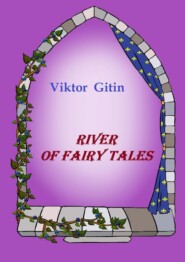
Полная версия:
River of fairy tales. Unprofessional translation from Russian

River of fairy tales
Unprofessional translation from Russian
Viktor Gitin
Illustrator Tatiana Zavialova
© Viktor Gitin, 2022
© Tatiana Zavialova, illustrations, 2022
ISBN 978-5-0055-9690-1
Created with Ridero smart publishing system
Prophetic Cushion
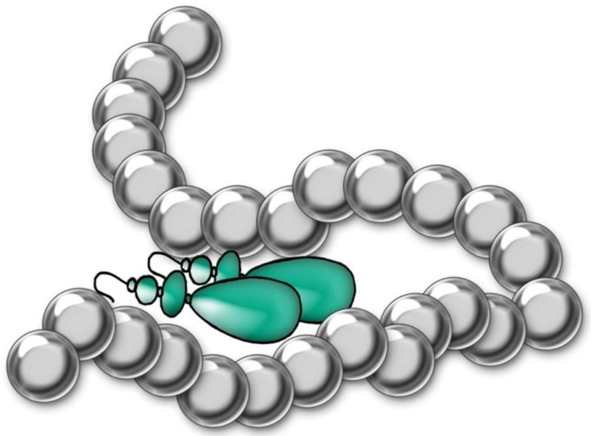
Once upon a time there lived two sisters. The younger sister was kind, nice and hardworking. Her name was Alena. The elder sister was wicked and envious. Her name was Clara. Their parents died, and the two sisters lived together in a house by the side of the road.
Once a poor old lady was passing by, and she stopped to spend the night in the girls’ house. Alena gave the lady something to eat and drink, and then prepared a soft featherbed for her to sleep on. She always treated guests and old people with deference and tried to appease them and make them comfortable.
The elder sister was not happy with the old lady’s presence. She was grumbling the whole evening, looking at her discontentedly, and did not even say good night to the old woman. She was too greedy to give the stranger food or shelter. The biggest wealth that Clara had amassed was her greediness. She was too greedy even to share the sunrays from her yard for free.
In the morning, when the guest was about to leave, she decided to thank the young girls. She took a soft embroidered cushion out of her bag and gave it to the sisters. When leaving, she smiled and said:
«This is not an ordinary cushion. When you sleep on it, you have prophetic dreams, and they come true when you wake up. You will see in your dream whatever you think of before sleeping. And whatever you see in your dream, will happen to you. A good person will see a good dream and his life will be good. And a bad person will see a bad dream, and it will be only fair that he will have trouble and misfortunes.»
The elder sister did not believe a word and accused the old lady of lying and telling cock-and-bull stories. And the younger sister accepted the gift with gratitude and wished the old woman a nice trip and a good day. So, they parted.
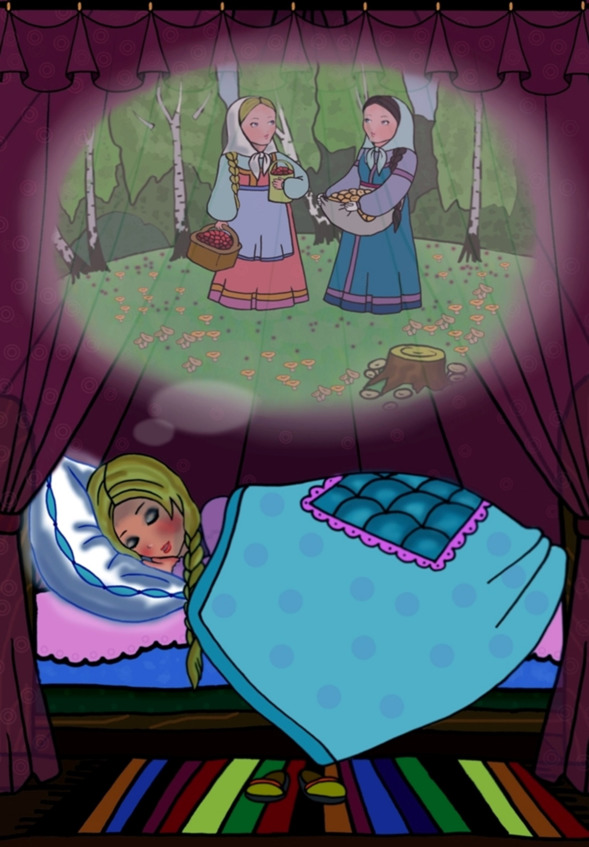
On the first night, Alena said:
«Sister, tomorrow we will go to the forest to pick berries and mushrooms. It’s good if we are lucky to find a lot of berries and mushrooms. We will bring them home and store them to use in the winter.»
With these thoughts Alena fell asleep. In her dream, she saw a forest and a wonderful meadow spangled with berries and mushrooms. They were walking around with her sister and picking them, and they had full baskets, too heavy to carry. Fortunately, they saw a man riding on a cart. He agreed to help the girls. They put their supplies in the cart, occupying all the space, and brought them home.
When Alena woke up, she told Clara her dream at once. But the elder sister started to make fun of the younger one:
«Silly you are! How can this be that two girls picked a whole cartful of berries and mushrooms? And met a man with a cart in the dense forest? And he helped them absolutely for free? Such things don’t happen in our life!»
Clara did not like her sister first of all because other people loved her, and she was better than her. Of all her relatives, she loved only herself. That’s why Clara laughed at the sister and her dream, and they went to the forest. But a miracle happened – they really happened to stumble upon a wonderful meadow. And there were so many mushrooms and berries there! You could pick them with a spade. And there were plenty of berries on the bushes, all of them ripe and juicy. Put a basket under a bush, shake the branches several times, and the basket is full of berries. Just one problem – where to put all this wealth? But suddenly they saw, just as Alena did in her dream, a man riding on a cart. He saw the sisters and said:
«Beautiful girls, shall I help you? I can bring everything you have gathered to your house.»
Clara did not believe in the man’s kindness and wanted to drive him away. But Alena accepted his help before her sister managed to do anything. On the contrary, she thanked him heartily. They loaded the whole cart with supplies and brought them all home. There were so many of them that the man got his share, too, in reward for his help. It’s only the greedy elder sister who did not want to share the supplies. She was walking about and grumbling that the man transported their berries and mushrooms too carelessly and mashed them on hollows and sloughs. But Alena gave the kind man his share of mushrooms and berries on the sly. He was thankful to her for that and promised to help her in the future, should an opportunity arise.
In the evening Clara thought about the magic cushion the old lady had given to them. What if it is really prophetic? The elder sister decided to see for herself and told Alena before going to sleep:
«Now I will sleep on the cushion and wish a dream to have.»
But Clara could not imagine what dream to wish. She was envious the whole day that the younger sister had such a good dream last night and everything turned out to as be promised. As on the next day the girls were going to the forest again to pick healing herbs and roots, Clara wickedly decided: «We will collect those herbs anyway! May wolves attack my sister in the forest and scare her very much!» Thinking so, she fell asleep. She dreamt of fierce wolves in the dense forest: they were running and chasing, snapping their teeth, and sputtering.
In the morning the elder sister sprang up terrified, in cold sweat. But she saw in her dream what she had wished. She did not tell Alena about her dream.
The sisters went to the forest and lost their way. They found themselves in a dark thicket. Sunrays could not get through; the huge trees covered the sky with their tops. Then fierce wolves appeared all of a sudden. The girls started to run, and the animals chased them. Everything happened just like in Clara’s dream. The sisters hardly managed to escape from wolves, their dresses were torn to pieces. Their hands and legs were scratched, bruised and bleeding, but they found their way in the forest and got away from trouble.
They came home and the elder sister said:
«That’s a bad cushion! I don’t want to sleep on it anymore. Sleep yourself on this bewitched cushion!»
She threw it to Alena. The younger sister agreed and asked:
«What shall I ask the cushion for to see in this night’s dream?»
Clara took offence at the cushion, but decided to make fun of her sister:
«It’s time we got married, but we have no dowry at all! We have no smart clothes or jewelry. Ask your cushion for luxurious outfits and beautiful jewelry.»
«Right, sister,» Alena replied.
Before going to sleep she sat down near the cushion and thought:
«It would be nice if we could have a new dress each and girls’ trinketry. Not much – just a little bit.»
Thinking so, she fell asleep. In her dream she saw Clara and herself walking in smart dresses. The earrings in their ears were glistening, and pearl necklaces on their necks were sparkling. Alena woke up and told her sister:
«Sister, in my dream I saw that we will have new dresses made of brocade, turquoise earrings and pearl necklaces.»
Clara started to scold her sister as she was offended and envious that she had had such a wonderful dream:
«You are silly and featherheaded! Where can we get all this? Will it fall from the sky? You believe this stupid cushion! And this is nothing, but the old woman’s lies!»
In the evening, foreign merchants returning from a fair were passing by their house. They sold their goods at great profit and were returning home merrily. The merchants asked the sisters to stay in their house overnight.
Clara met the guests angrily as she usually did. She did not take care of them, just mumbled something rude. And Alena welcomed the unexpected guests with a smile, gave them something to eat and drink and put them to bed. In the morning, before leaving, the merchants agreed to thank the younger sister for such a hearty welcome. They searched through the remains of their goods and gave her two brocade dresses, a pair of turquoise earrings and a pair of white and blue pearl necklaces. They liked the kind girl very much: she welcomed them heartily, gave tasty food, said kind words. And they did not want to take these goods home anyway. It was a relief for the merchants and a delight for a nice girl. The guests said good-bye and left in a good mood.
Clara saw that and moved to complain:
«I asked the dowry for myself, and the wretched and ungrateful merchants gave all the gifts to you! Where is the justice? I am deprived and offended!»
«Don’t be angry, my dear sister. If you like these dresses, earrings, and necklaces, take them all for yourself!» Alena offered her the gifts with a smile.
The younger sister was not greedy and loved her grumbling sister. She had no other relatives in the world. And Alena’s heart was pure and light. She felt bad if her elder sister was grieving or angry. That’s why she always tried to appease Clara and make her feel good.
The elder sister took away all the merchants’ gifts at once and started to scold Alena again:
«You are so unsophisticated! Why did you ask the cushion for so little? These dresses and jewelry are not sufficient. I want more – and more luxurious, too!»
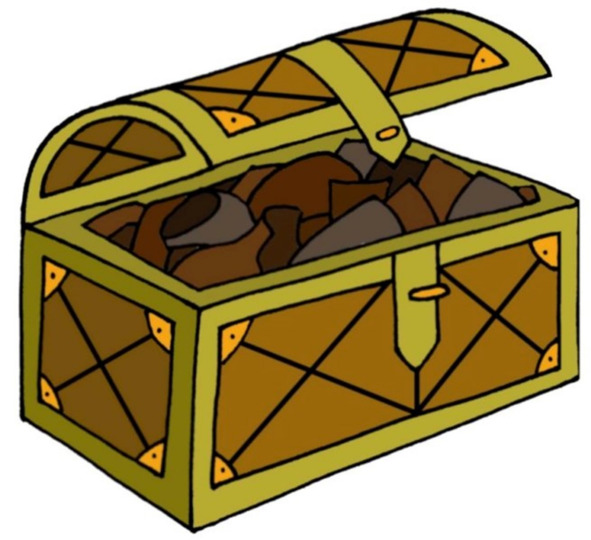
Now Clara clearly understood that the cushion was really magic. The dreams come true for the third time in succession. She took away the cushion and said:
«This night, I will dream of our wealth myself. Go to bed, and I will think what to wish.»
In the evening Clara sat down and started to ponder: «I wish a lot of gold and silver for myself, and my sister will get shards and pieces of glass. She shouldn’t dress and look better than me!»
Clara went so deeply into her dreams, wishing to offend and humiliate her sister as much as possible, that she fell asleep with these thoughts. In her dream she saw a barrel of broken shards and a chest of glass pieces.
On the next day, a glassblower with his goods and a potter with pots were passing by their house on their way to the fair. They asked to stay in their house overnight. The elder sister looked at the guests and saw that they were not rich, and no profit could be obtained from them. She told them to go to the shed and spend the night there. She was so angry that she failed to get gold and silver as a dowry that she was walking about on the jump.
At night, when everybody fell asleep, she went out and in anger smashed some jugs and glassware that belonged to the craftsmen. In the morning they woke up and saw that somebody had done the smashing. The glassblower and the potter turned sad. But they had nothing to do, they picked up the remains of goods and cleaned the yard before leaving. They put the shards and pieces of glass in the barrel and in the chest, so that the sisters would not have to sweep so much after them.
When Clara woke up and went out, she saw that everything happened exactly as she had seen in her dream last night. She realized that the younger sister’s dreams were better when they came true and started to hate Alena even more because of that. Clara did not know her real value, so she considered herself to be priceless. As for her sister, she treated her as an obstacle in her life.
«This night we will sleep on the cushion together,» Clara decided to dodge.
«It’s time we thought about handsome fiancés. So, we will act in this way – you will wish a fiancé for me in your dream, and I will wish one for you.»
«Let’s do as you say, sister,» Alena agreed obediently.
They went to sleep side by side and put their heads on the edges of the cushion.
Alena dreams before going to sleep: «It would be nice if a good-hearted young man on a white horse came to us. He would be so dashing, handsome and well-built…»
She fell asleep and saw exactly what she thought in her dream. And she also saw a palace and a great feast. Singers were singing, musicians were playing merry tunes, guests were dancing boldly. Everybody around was celebrating a wedding.
And Clara thought before going to sleep: «May my sister have an old, ugly and wicked fiancé. May she live in the thicket, drudge with her husband all her life and appease him!»
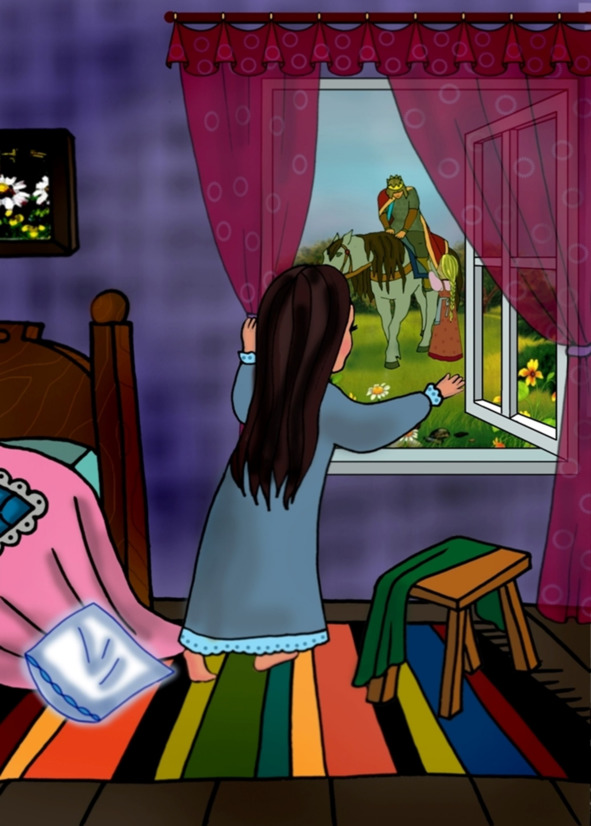
That’s what she saw. A dense forest and an old terrible bandit sitting on a crumbly stump. Around him, his terrible companions were feeding a fire, roasting meat, drinking home brew, swearing, and fighting – thus celebrating their chieftain’s wedding.
On the next day, early at sunrise, a squad of brave warriors was passing by the house. It was headed by a young and dashing prince. The younger sister was hardworking, and she always set about her duties in the yard since early morning. She woke up at dawn and was working in the vegetable garden when the warriors were passing by along the road.
The prince saw Alena and liked her so much that loved her at first sight. He jumped down from his horse and asked her to marry him. The girl liked the prince very much, so she agreed at once, without much thinking. She was modest and was not used to flirting and dallying. The young man put her on the horse and took her to his palace to celebrate a wedding.
And Clara liked to sleep until midday, but the noise in the yard woke her up. She looked out the window and froze. Her sister was going away with a young handsome prince and his men. And she could see that the youth was looking at Alena with loving eyes and she was looking at him in the same way.
The elder sister rushed out in her night gown. She wanted to shout that Alena was taking away her dream, her fiancé, her happiness. But it was too late – they had vanished into thin air.

Clara returned to the house and started to cry and smash anything that got into her hands – out of spite, envy, and offence. She was raging until the evening and could not stop. Closer to nighttime, some forest bandits suddenly came to her house. They saw a girl rushing about in anger, smashing, and throwing everything around. They laughed and said:
«Such a wicked hostess! She will suit perfectly for our bandit affairs. She is quite like us. She will make a good wife for our chieftain.»
They seized Clara and took her to the forest. And they also burned the house where the sisters lived and all the constructions there, so that she would have no desire to run away and return home.
The bandits brought the girl to the forest and gave her to their chieftain. He was old and ugly. He was sitting in the middle of the meadow on a crumbly stump and picking his teeth disgustingly. He saw Clara and laughed nastily and loud, saying in his strident voice:
«Now the forest is your house! You will appease me all my life. And if you don’t obey, I will punish you and give you to fierce wild animals.»
The chieftain ordered the bandits to prepare a wedding celebration. And then everything happened in the way Clara had wished in her dream for her younger sister. It was so because she did not remember the words of the old lady who had given them the cushion. The old woman warned: you will get what you wish. A good dream will come to a good person, and his life will be good, too. And a bad person, doing bad deeds, will have a bad dream and trouble will come.
When the young prince brought Alena to his palace, he made a nice wedding. The feast was so marvelous that you couldn’t tell in a tale or write with a pen. Guslars were playing, traveling minstrels were dancing, singers were singing. And the guests celebrated for three days and three nights.
And as for the magic cushion, it should have perished in the fire when the bandits burned the house. Or perhaps it did not. It is magic anyway. Who knows, probably it exists somewhere in the world. People have new dreams on it. And they are not just dreams, they are prophetic ones – they always come true! Kind people have good dreams. And wicked people have the dreams they deserve!
Two Seeds
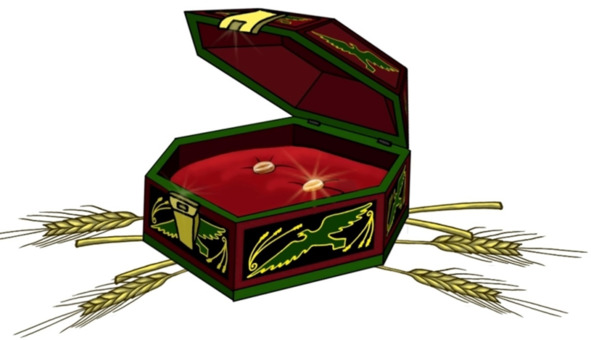
Once upon a time there was a ship which sailed in the sea. But the storm blew up and the ship sunk. Only two people got saved, two castaways, the farmer and the merchant. They found themselves on a desert island. Nobody to be seen for miles and miles around… only a thick forest grows, and the fields spread. How to survive in such unpopulated place? The only luck it happened in the beginning of summer. There were mushrooms and berries in the forest, all kinds of fruits ripened on the trees. They were glad to find food for the first time and rejoiced they would not die of hunger.
Thus, they looked around, sat on an old log and started to think how they would survive on this island. Suddenly an old raven appeared as if from nowhere. He sat on a branch, bowed his head slightly on the side, and stared at the people. The merchant wanted to drive the bird away with a stick. He was so very angry and frustrated because of the shipwreck and the fact that all his merchandise sank in the sea. He flourished a stick at the raven when the bird croaked and then said with a clear human voice:
«I am the owner of this island. You are my guests now, so I will help you a bit. In the very center of the island there is a big tree stump. There is a casket on it. It holds two magic seeds. One seed is common, the other one is gold. Go and plant them in the field. As man sows, so he shall reap!»
Upon having spoken these words the raven flew away. The Farmer and the Merchant were surprised at what happened but went to where the raven had shown. There they found the tree stump and the casket.
The Merchant said:
«I will take the gold seed! I will plant it and will grow the gold wheat. I will be rich again. Gold is always useful; one can live everywhere if one has gold. I know this from my own experience. One can buy everything with gold.»
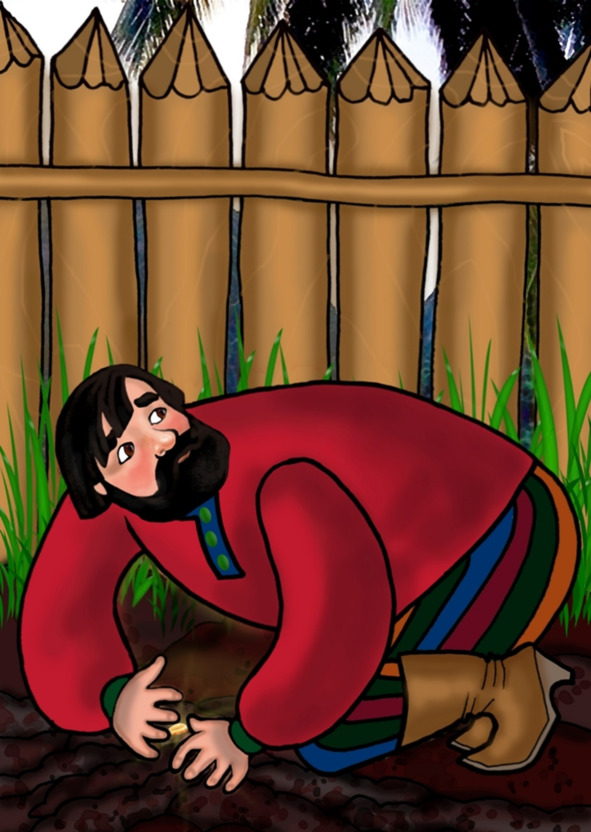
«I don’t know how to live with gold. I have never chased riches in my life,» the Farmer retorted. «All my life I’ve been growing wheat. I think I will take the ordinary seed and plant it.»
«You are a fool,» the Merchant scolded him. «You understand nothing in life that is why you are so poor. Take your ordinary seed. And don’t even look at my gold one!»
The Merchant grabbed the gold seed and ran away before the Farmer changed his mind. He was hoping for the future but forget about the present, as many people do. The most intolerable thing for him was other people’s wealth.
Thus, they went every which way. On the opposite sides of the island, they have built huts where they lived. Near each hut each one of them spotted a good lot to plant their seeds.
The Merchant dug a hole in the field and planted his gold seed. He tried to hide and cover where he did it so that the Farmer wouldn’t see it so well that instantly forgot where he planted his seed. First, he was worried, and then calmed down. «That was a smart idea of mine,» he thought. «The seed is magic; it’s made of gold, so one doesn’t need to take care of it. It doesn’t need any work. The only thing I have to do is to wait till the gold wheat grows.»
Usually, the more stupid is the person the cleverer he thinks he is. In fact, everybody has some human stupidity but not everybody shows it and boasts it.
So, by day the Merchant went to the forest to gather mushrooms, berries, and fruits – to have something to eat. The rest of the day he just slept, lounged away, and basked in the sun. He was dreaming how he would get rich with his harvest of gold wheat, how he would live rich and wealthy doing nothing. He was so happy thinking this he even envied himself.
The ordinary seed was magic, too, but still required a lot of work. To grow wheat in the field one has to plow it, drag it, fertilize it, weed it away, water it… Everything what a farmer does when he grows normal wheat.
Thus, the Farmer started to plow and drag his field. It was a difficult task for one person. He had neither horses nor oxen. Food he had to gather in the wood took much time, too. He’s been working night and day fearing he would be late with preparing the land.
So, he came to the Merchant.
«Please, help me to plow the field. I won’t be able to do it myself,» he said.
«What for?» the Merchant was indignant. «I have a lot of things to do, too!»
Meanwhile he was only basking in the sun, eating the sweet berries heartily. The Farmer only sighed sadly and went to his field – to go on working. He went on working on his land without any sleep or rest.
The Merchant only looked at him and thought: «I don’t believe this beggar. I have to hide my field from him. When my gold wheat grows, he’ll get envious and will most definitely coma and try to steal it!»
Thus, the Merchant started to make a fence around his hut and his field, trying to hide his crops from the Farmer.

The time passed, the Farmer planted his seed. Now the land should be fertilized to get a good harvest from it afterwards. Again, he came to the Merchant.
«Please, neighbor, could you help me to fertilize my field,» he asked. «It’s so difficult to do it alone, and you just lay behind your fence doing nothing.»
«Don’t be stupid,» the Merchant snapped back. «I work just as hard. I protect my field from birds and wild animals. Can’t you see I’ve built a fence? Go away and do everything yourself!»
The Farmer went away. He gathered some manure and bird droppings and threw it evenly in the field. It was quite difficult, but he did fertilize the entire field by himself.
The Merchant spied on him from behind his fence and thought: «My fence is too small. The Farmer could easily get over it. I will gather more pricks and burrs in the forest tomorrow and will throw them around my fence. Thus, he will never steal my crops.»
The Merchant went to the forest, gathered big burrs, and laid his fence with the sharpest pricks. The pricks stuck out like true daggers – nobody could approach the fence.
Some more time passed. Now the season of weeding the field away came. The Farmer went to the Merchant’s hut and shouted from outside the fence:
«Maybe you could help me to weed away my field? I’ve got too much of them!»
«No way!» the Merchant got really mad behind his thorny fence. «My gold fears no weeds. And you have to deal with yours yourself.»
Again, the Farmer turned around and went away. The Merchant was nervous when watching him go. «I think I have to dig a ditch around my fence, or the farmer would really come and steal my gold.»
Thus, he went on digging a ditch around his hut and the field in the night. The ditch was so deep the one falling into it would definitely break his neck and never get out alive.
Meanwhile the Farmer’s wheat came into head. It required to be watered now, and there were no rains on the island. The Farmer had to bring water in buckets from the nearby spring. But it was so difficult to do just by himself. Again, he came to the Merchant and started asking him for help.
«Dear neighbor, please, come to me, help me to water the field. I will share my crops with you afterwards.»
The Merchant got very scared. «The Farmer wants to share his crops! It means he wants some part of my gold harvest, too! Who would share just like that? I would never do such a stupid thing!» The Merchant was so greedy he didn’t want to part even with the things he didn’t need anymore. As for sharing, the Merchant considered it a true crime against himself.
So, he stood behind his thorny fence and deep ditch and shouted to the Farmer:



